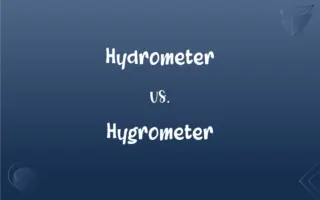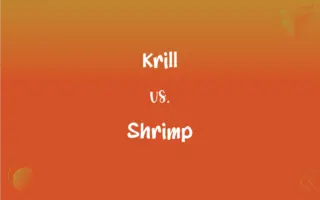Silicon vs. Silica: What's the Difference?
Edited by Aimie Carlson || By Harlon Moss || Updated on October 23, 2023
Silicon is a chemical element, while silica is silicon dioxide, commonly found in nature as quartz.
Key Differences
Silicon is a chemical element with the symbol Si and atomic number 14. It is a hard, crystalline solid and is a key component in microelectronics and semiconductors. Silica, on the other hand, is a compound consisting of silicon and oxygen, represented as SiO2.
Though both silicon and silica have the element silicon as a component, their properties and uses differ significantly. Silicon is used extensively in electronics due to its semiconductor properties. Silica, being abundant in nature as sand or quartz, is primarily used in the production of glass.
Silicon, as an element, is rarely found in its pure form in nature. Instead, it usually exists bonded with oxygen as silica. Through a refining process, silicon can be extracted from silica and then used in various industries, from electronics to metallurgy.
The term "silica" often refers to the crystalline form found in nature, which can be processed into various forms like silica gel or fumed silica. While silicon's electronic properties make it integral to modern technology, silica's physical properties make it indispensable in materials science.
In essence, while silicon and silica are intimately connected due to their elemental relationship, they serve widely differing roles in science, industry, and daily life. Their distinct characteristics and applications make them unique, despite their intertwined nature.
ADVERTISEMENT
Comparison Chart
Nature
Chemical element
Compound
Chemical Representation
Si
SiO2
Common Uses
Semiconductors, electronics
Glass-making, foundries
State in Nature
Rarely found in pure form
Abundant as sand or quartz
Relationship
Fundamental element
Contains silicon as a primary component
ADVERTISEMENT
Silicon and Silica Definitions
Silicon
A hard, crystalline chemical element.
The computer chip is made primarily of silicon.
Silica
Silicon dioxide, commonly found as quartz.
The beach sand is primarily composed of silica.
Silicon
A metalloid in the carbon group.
Silicon can be found in nature bonded with oxygen.
Silica
A crystalline compound with diverse applications.
Fumed silica is used in cosmetics and toothpaste for its thickening properties.
Silicon
A semiconductor used in electronics.
Silicon wafers are foundational in the tech industry.
Silica
A material derived from silicon and oxygen.
Silica beads are often found in those tiny packets to absorb moisture.
Silicon
Element with the atomic number 14.
Silicon's unique properties make it valuable in the digital age.
Silica
A compound used in glass-making.
High-quality silica is required for making clear glass.
Silicon
An essential component in microchips.
The demand for pure silicon has increased due to tech advancements.
Silica
The primary component of sand.
Silica mining is essential for various industries.
Silicon
A nonmetallic element occurring extensively in the earth's crust in silica and silicates, having both a brown amorphous and a gray lustrous crystalline allotrope, and used doped or in combination with other materials in glass, semiconducting devices, concrete, brick, refractories, pottery, and silicones. Atomic number 14; atomic weight 28.086; melting point 1,414°C; boiling point 3,265°C; specific gravity 2.33 (25°C); valence 2, 4. See Periodic Table.
Silica
A white or colorless crystalline compound, SiO2, which in the form of quartz and certain other minerals is a chief component of the earth's crust. Silica sand is used in making a wide variety of materials, such as glass and concrete.
FAQs
Can silicon be found in its pure form in nature?
Rarely, silicon usually exists bonded with oxygen as silica.
Why is silica used in food packets?
Silica gel packets are used as desiccants to absorb moisture.
Why is silica added to cosmetics?
Silica can act as a thickening agent and provides a smooth application.
What industries rely heavily on silica?
The glass, construction, and foundry industries rely significantly on silica.
Is silicon a good conductor of electricity?
Silicon is a semiconductor, which means its conductivity can be altered and controlled.
How is silica extracted?
Silica is typically mined from the earth, especially from areas with abundant sand.
What makes silicon ideal for computer chips?
Silicon's semiconductor properties allow for control of electrical current, essential for microchips.
Is silica gel edible?
No, while non-toxic, silica gel is not meant for consumption.
What are the physical properties of silicon?
Silicon is hard, crystalline, and has a shiny, metallic luster.
Is silica found in plants?
Yes, many plants uptake silica from soil for strength and structural support.
Can silicon be magnetic?
In its natural state, silicon is not magnetic, but certain treatments can induce magnetism.
What is silicon primarily used for?
Silicon is primarily used in semiconductors and electronics.
How is pure silicon obtained from silica?
Through a refining process, usually involving high temperatures.
What is the primary application of silica in industries?
Silica is primarily used in glass-making and foundries.
Is silicon a metal or non-metal?
Silicon is a metalloid, having properties of both metals and non-metals.
Can silica be harmful if inhaled?
Yes, inhaling fine silica dust can lead to silicosis, a lung disease.
Why is silicon used in solar panels?
Silicon can convert sunlight into electricity, making it ideal for photovoltaic cells.
Is silica the same as sand?
Yes, sand is primarily composed of silica, specifically quartz.
Are silicon and silicone the same?
No, while silicon is a chemical element, silicone is a synthetic polymer.
What forms can silica take other than sand?
Silica can be processed into gel, fumed silica, and crystalline forms.
About Author
Written by
Harlon MossHarlon is a seasoned quality moderator and accomplished content writer for Difference Wiki. An alumnus of the prestigious University of California, he earned his degree in Computer Science. Leveraging his academic background, Harlon brings a meticulous and informed perspective to his work, ensuring content accuracy and excellence.
Edited by
Aimie CarlsonAimie Carlson, holding a master's degree in English literature, is a fervent English language enthusiast. She lends her writing talents to Difference Wiki, a prominent website that specializes in comparisons, offering readers insightful analyses that both captivate and inform.






































































